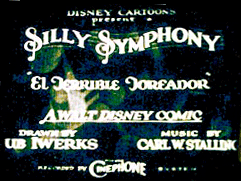 Why did Ub Iwerks leave Walt Disney's employ in January 1930? For leave he did, and fast; enticed by an offer that, according to Michael Barrier and John Kenworthy, Iwerks at first didn't realize was masterminded by Pat Powers, Disney's own distributor.
Why did Ub Iwerks leave Walt Disney's employ in January 1930? For leave he did, and fast; enticed by an offer that, according to Michael Barrier and John Kenworthy, Iwerks at first didn't realize was masterminded by Pat Powers, Disney's own distributor.Conflict with Walt himself is thought of as the main reason for the split, with the suggestion that Walt took Ub's talent for granted. But another reason has been leveled, too. At the same time that Iwerks got bad vibes from his longtime friend and employer, he is also said to have received a growing number of good vibes, plaudits, and credits from voices outside the studio. This external praise, as much as any internal strife, may have convinced Ub that departure was in his best interest. Once he made that departure, the praise continued quite strongly for a time—seemingly validating Iwerks' action.
 Most of us haven't seen actual examples of this praise before, but today I'm presenting two for your reading pleasure. The first example, from Germany's Reichsfilmblatt in 1930, was reprinted in Storm and Dreßler's superb Im Reiche der Micky Maus (1991). Coming on the cusp of Iwerks' independence, this early announcement of his solo productions explains that
Most of us haven't seen actual examples of this praise before, but today I'm presenting two for your reading pleasure. The first example, from Germany's Reichsfilmblatt in 1930, was reprinted in Storm and Dreßler's superb Im Reiche der Micky Maus (1991). Coming on the cusp of Iwerks' independence, this early announcement of his solo productions explains thatFollowing the exemplary success of capricious little Mickey Mouse, a new star has now turned up in sound film heaven: Flip the Frog. Again it is Ub Iwerks, the ingenious creator and artist of Mickey, who has taken a great hop forward. His Flip is far more capable than the spindly mouse of mimicking and mocking the posturing and fussing of humanity...
 Yet a better, if briefer, clue to the admiration Iwerks received came months earlier in fall 1929—in an item I don't think has ever been reprinted. When Columbia Pictures—again through Pat Powers—first contracted to release Disney's Silly Symphonies, its four-page "press sheet" was remarkably frank about how at least certain parties viewed the Disney/Iwerks relationship. "Walt Disney is head of the studio," Columbia's corporate voice explains, "but the artist who perfects the details is named 'Ub' Iwerks. He is assisted by a staff of 'animators' [sic], who follow his sketches and continuity..."
Yet a better, if briefer, clue to the admiration Iwerks received came months earlier in fall 1929—in an item I don't think has ever been reprinted. When Columbia Pictures—again through Pat Powers—first contracted to release Disney's Silly Symphonies, its four-page "press sheet" was remarkably frank about how at least certain parties viewed the Disney/Iwerks relationship. "Walt Disney is head of the studio," Columbia's corporate voice explains, "but the artist who perfects the details is named 'Ub' Iwerks. He is assisted by a staff of 'animators' [sic], who follow his sketches and continuity..."Reality notwithstanding—the same presskit calls "Oswald the Cat" an earlier Disney creation and scrupulously avoids mentioning Mickey, a non-Columbia property until 1930—the implication could not be more clear: Disney was the businessman, Iwerks the artiste and director. The back page's biography of Disney, calling him a "child of fate," certainly lavishes Walt with purple prose, yet still cannot walk back that first impression.




 (Momentary break to discuss the poster art illustrated in Columbia's presskit: I've seen these one-sheets before, but never any for El Terrible Toreador (1929) until now. The poster and presskit call the film The [sic] Terrible Toreador, but that's actually a mistake; though the original titles are not on DVD, collectors possess them—see image at left—and they carry the commonly accepted El at title's start.)
(Momentary break to discuss the poster art illustrated in Columbia's presskit: I've seen these one-sheets before, but never any for El Terrible Toreador (1929) until now. The poster and presskit call the film The [sic] Terrible Toreador, but that's actually a mistake; though the original titles are not on DVD, collectors possess them—see image at left—and they carry the commonly accepted El at title's start.) Only some time after Iwerks' split did the first impression begin to recede. Later in 1930, another German article was entitled "The True Creator of the Mickey Mouse Films." It contended that
Only some time after Iwerks' split did the first impression begin to recede. Later in 1930, another German article was entitled "The True Creator of the Mickey Mouse Films." It contended thatThe creator of the now world-famous Mickey Mouse is the American film producer Walt Disney. The original concepts for Mickey and his inamorata Minnie stem from him, as do all the ideas for the Mickey Mouse film treatments. The artist Ub Iwerks, falsely credited as the father of the Mickey Mouse films, was initially an employee of Walt Disney. He has long since been expelled from the Disney firm.From hero to pariah overnight. What a crazy trip.